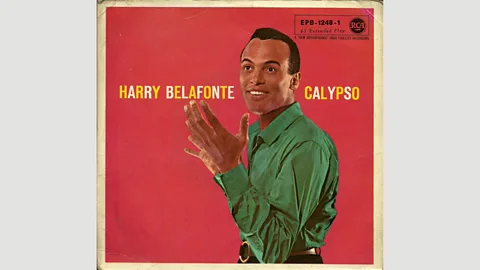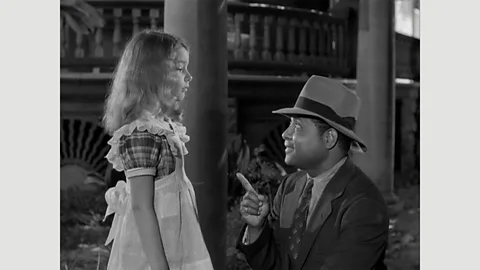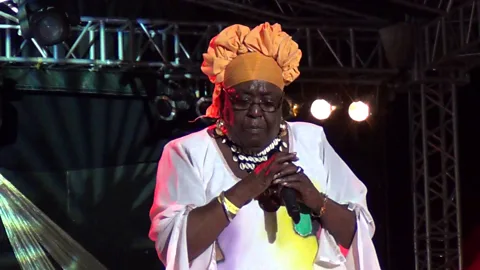The subversive power of calypso music (original) (raw)

 Alamy
Alamy
Its bouncy beats and tuneful melodies often serve up serious, even subversive, messages. The music demands more careful listening, writes Benjamin Ramm.
Outside the Caribbean, calypso music is regarded as carefree, light-hearted, even frivolous. Yet calypso is among the most political of all musical traditions – a form that combines joyful cadences with serious and often subtle social commentary. Originating in the struggle for emancipation, the genre is characterised by its witty and imaginative treatment of themes as diverse as racism, the Cold War, and the cost of living.
In 1881 Britain banned percussion in the Caribbean – so steel pan music was born
Misconceptions about calypso stem in part from the commercial success of Harry Belafonte’s 1956 record Calypso, the first LP album to sell over a million copies. The most famous track, Banana Boat (Day-O), is not actually a calypso, and the album is a celebration of Jamaica, even though calypso originates on the other side of the Caribbean, in Trinidad. In one of the first globally broadcast Carnival competitions in 1993, calypsonian the Mighty Chalkdust performed Misconceptions to challenge the “false images” of the island (“we are not part of Jamaica / though we sing reggae, that’s not our culture”) and its music (“so when you hear Belafonte and Mr Poindexter / that is not kaiso [calypso], that is brandy mixed with water”).
Calypso is rooted in traditions developed by West African slaves brought to the Caribbean. Kaisos were performed by a griot or chantwell_,_ a local bard who told stories in song, offering social commentary through praise, satire or lament. Their lyrics often mocked slave masters and would be recited at the harvest festival of Canboulay, a parallel with the pre-Lent Carnival, from which even freed slaves were barred. In 1881, percussion was banned by the British colonial authorities, which resulted in the innovation of steel pan music, initially consisting of frying pans, dustbin lids and oil drums.

 RCA
RCA
Harry Belafonte’s Calypso was the first long-playing album to sell over one million copies in the US – he is of Jamaican and Martiniquan descent, not Trinidadian (Credit: RCA)
At first, calypso was performed in the format of call-and-response in an intimate tent setting. Calypsonians both entertained and challenged their audiences – an approach adopted by the finest exponents of the modern form, such as The Maestro. His 1974 tent performance of Mr Trinidad includes the couplet: “you criticizing the way you live / yet you can’t produce an alternative”.
Calypsonians have borne outlandish names like Attila the Hun, the Mighty Terror and Macbeth the Great
Calypsonians also challenged each other with extempo performances of prowess and ingenuity, sans humanité (‘without mercy’). As well as political commentary, there was innuendo and bravado, as evidenced by the outlandish names of the calypsonians, such as Attila the Hun, the Mighty Terror and Macbeth the Great.
Rhymes and rants
With the first commercial recordings in the 1920s and 30s, calypso entered its golden era. The form became a means of communicating and interpreting political events, and a primary news source for many islanders. The content of each song would be debated by citizens and politicians, with topics that included colonial mismanagement (the subject of Attila’s song Commissioner’s Report), abuses of civil liberties (King Radio’s Sedition Law) and corruption (Growling Tiger’s Money is King) – which eventually led to censorship (prompting Attila’s The Banning of Records, which was itself banned).

 Turner
Turner
Sir Lancelot was the first calypso singer to score hits in the US – he sang ‘let the fascists talk about superior race, it will lead them to defeat and disgrace’ (Credit: Turner)
Yet their critiques were nuanced, and the relationship with the authorities was not always hostile. Attila’s Five Year Plan and Here Now and Long Ago celebrate the rapid developments on Trinidad, and some even praised benign colonial administrators (Lord Executor’s We Mourn the Loss of Sir Murchison Fletcher), while many felt warmly towards the monarchy.
The first four winning songs of the Calypso King (now Calypso Monarch) competition, founded in 1939, highlight the political focus: Trade Union, Rise and Fall of the British Empire, Adolf Hitler, Daily Mail Report. Unemployment caused by the Great Depression inspired Tiger’s powerful Worker’s Appeal and Executor’s I Don’t Know How the Young Men Living.
Since Trinidad became sovereign in 1962, calypsonians have affiliated with political parties and their figureheads, most notably Dr Eric Williams, the ‘father of the nation’ who led the island after independence for 19 years until his death. Dubbed William the Conqueror in the Mighty Sparrow’s calypso, Williams’ shadow continues to loom large over Trinidadian politics, as lamented by Chalkdust in I Can’t Bury Eric Williams.

 Chalkdust
Chalkdust
Since he first claimed victory in 1976, Chalkdust has won the Calypso Monarch contest nine times, including in 2017 (Credit: Chalkdust)
Calypsonians often speak directly to politicians in their songs
Unlike the American folk tradition, which tends to distance itself from the political class, calypsonians speak directly to politicians, notably in the Mighty Explainer’s Chambers addressed to Williams’ successor, or Rootsman’s Good Morning Mr Manning. Calypsos also offer prescriptive solutions to social problems, from the Mighty Leveller’s How to Stop Delinquency (“Outlaw retrenchment, create more employment”) to the Mighty Prowler’s Build More Trade Schools about the importance of vocational education.

 Alamy
Alamy
There have always been female chantwells but Calypso Rose, seen here performing in Cannes in 2016, was among the first to gain commercial success (Credit: Alamy)
Skilled calypsonians communicate a point with a pithy rhyme, such as “public transportation is an abomination” or “children come out of college without elementary knowledge” – both lyrics from the Mighty Sparrow, second most decorated Calypso Monarch after Chalkdust. Sparrow mastered the ‘cost of living’ genre with calypsos such as No, Doctor, No (directed at Williams) and even sang repeatedly in defence of income tax, with PAYE and You Can’t Get Away from the Tax. Sparrow’s sharp social critique and partisanship led him into conflict with fellow calypsonians and disgruntled politicians: “If you tell them that the economy is no longer in full bloom / Then you become a prophet of doom & gloom”.
Gazing outward
Some of the most acclaimed calypsos address racial segregation in the US, such as Lord Invader’s Crisis in Arkansas and the Mighty Terror’s Heading North about the colour bar in the southern states. The hypocrisies of Western democracies were critiqued by Lord Cristo:
They will lynch and torture you in Jacksonville
Frame and persecute you in Notting Hill
Exercising inhumanity
And still proclaiming to believe in democracy
Calypsos of the 1960s reflect a growing racial consciousness, as expressed by the Mighty Duke’s Black is Beautiful:
No more hot comb to press we hair
No more bleach creams to make us fair
Proudly I say without regret
No more inferiority complex
This theme had been articulated by Lord Kitchener in Black or White (“You can never get away from the fact / If you not white, you considered black”), which admonishes a mixed race woman for ‘passing’. Duke’s calypso similarly frames the matter in black/white terms:
There’s no in-between in race
You got to find your natural place
To live a lie it’s clear to me
You are ashamed of your ancestry.
Excluded from this “natural” classification are mixed-race Trinidadians, doubly rejected, as the Mighty Dougla points out in Split Me in Two. Trinidad is ethnically diverse – a rainbow Model Nation in Sparrow’s declaration – yet calypso, traditionally the art form of the Afro-Trinidadians, frequently reflects tensions with the wealthier Indo-Trinidadian community.

 Alamy
Alamy
Singing Sandra is one of the most popular female chantwells because of songs in which she addresses economic, political and sexual exploitation of the vulnerable (Credit: Alamy)
Black consciousness extended beyond Trinidad, particularly in the work of Black Stalin, who sang Caribbean Unity and United Africa. Solidarity with the ancestral continent is evident in the Mighty Cypher’s Rhodesia Crisis and Lord Brynner’s mythic Uhuru-Haranbee. This internationalist outlook included commentary on the Cold War, with calypsos such as Lord Ivanhoe’s Lift the Iron Curtain and Sparrow’s Russian Satellite.
Until the emergence of Calypso Rose in the mid-1960s, the genre had been dominated by men, despite a long tradition of female chantwells. Calypso Rose’s success in the 1970s culminated in her becoming the first woman Calypso Monarch. The second, Singing Sandra, has proven to be one of the most astute political commentators, with her critiques of poverty (Voices from the Ghetto), sexual exploitation (Die With My Dignity) and militarism (The War Goes On). Denyse Plummer became the third female Monarch with her calypso Nah Leaving, a resolute rejection of emigration, a topic much discussed since Lord Kitchener disembarked on the Empire Windrush and gave an impromptu rendition of London is the Place for Me.

 Alamy
Alamy
Carnival in Trinidad still follows the global calendar of Carnival events that take place before Lent, while Notting Hill Carnival takes place in late summer (Credit: Alamy)
Calypsonians who stayed in Trinidad were able to influence its political culture. In 1986, the governing People’s National Movement (PNM) party lost an election for the first time in 30 years to the National Alliance for Reconstruction (NAR). The NAR chose as its theme tune Gypsy’s The Sinking Ship and was aided by Déplé’s catchy Vote Dem Out (“Vote dem out with calypso & joyous refrain / Let’s put our country together again”). On the back of this landslide victory, Gypsy released Respect the Calypsonian in which he warned: “I could write a song to make government strong, / I could write a song to bring government down”. He continued:
I write the songs that champion the poor man’s cause,
I who write the songs that circumvent the laws,
From slavery to emancipation, I’ve made my contribution.
The role of the calypsonian, in the words of Black Stalin, is as “the people’s watchdog / Elected for life”. Indeed, the artist acclaimed as The People’s Calypsonian, Bro Valentino, sang: “the calypsonian is the only true opposition”.
In Leader of the Opposition, the Watchman lampoons calypsonians such as Sugar Aloes who still endorse election campaigns (“Now that the PNM win / Aloes has naught to sing / He can’t bite the hand that feeds him”). Just as Attila successfully entered politics in the 1940s, Watchman himself became a police chief – yet in the calypso tent he retained his scrutiny:
Is criticising your government really the wrong approach?
Are all leaders in parliament above & beyond reproach?
In 1945, the Andrews Sisters scored a huge hit with their sanitised version of Lord Invader’s Rum and Coca-Cola, stripping the original of its critique of prostitution near a US naval base in Trinidad. The upbeat cadences of calypso were always likely to be misconstrued (or, some would say, misappropriated) and critics argue that Carnival in the diaspora has lost it social consciousness. Yet in Trinidad, the political tradition continues today – a rare example of a truly democratic art form. After all, in which other genre would an artist title his song, as Contender did in 2003, More Elections the Better?
Facebook page or message us on Twitter.
And if you liked this story, sign up for the weekly bbc.com features newsletter, called “If You Only Read 6 Things This Week”. A handpicked selection of stories from BBC Future, Earth, Culture, Capital and Travel, delivered to your inbox every Friday.